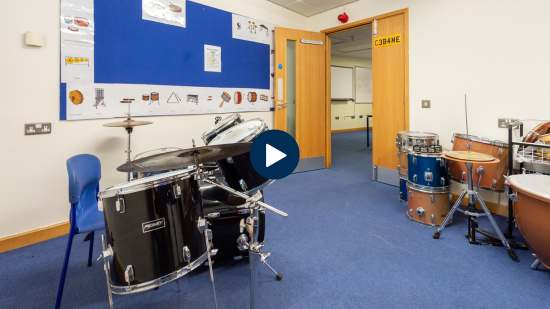Why should I study this subject?
This is a big question with lots of potential answers but here are just a few. Through music we can develop a whole range of complex skills considered highly valuable to universities, employers and for general life beyond school (e.g. creative thinking, adaptability, communication and confidently performing/presenting in front of audiences).
Being a subject with practical components, music can offer a nice change of pace on your timetable and it is a subject that allows you the time to develop and hone your talent for composition and/or performance. This is reflected in the fact that 60% of the assessment grade is coursework based, which can take some of the pressure off when it comes to your final exams in Year 11. Perhaps most importantly though, let us not forget that music is at its core an enjoyable, stimulating and intellectually challenging subject to study.
What will I study?
GCSE Music is divided into three main components:
- Performing (playing music)
- Composing (writing new music)
- Appraising (listening to and analysing music)
Most of our time will be spent looking at four key areas of music, including art music (classical), popular music (pop, rock, rap, electronic etc.), film music, and music for ensemble. However, there might also be some opportunities for others if there's a particular kind of music that you are interested in exploring.
How will I be assessed?
We follow the OCR syllabus and this means that your final grade is decided by two practical components and a written examination at the end of the course.
Component 1: Performing
- We will record two examples of you performing music
- This will be one solo performance and one as part of a group/band/ensemble
- 30% of GCSE
Component 2: Composing
- You will compose two pieces of completely original music
- One piece will follow a brief set by the exam board each year (e.g. music for a horror film) and one is a free choice
- 30% of GCSE
Component 3: Appraising
- Written exam covering each area of study from the course as a whole
- Exam duration: 1 hour 15 minutes
- 40% of GCSE
Are there higher and foundation tiers?
No. All students sit the same exam and study the same content, with questions designed to allow achievement across the full range of grades (9–1).
Are there any trips or enrichment opportunities?
Yes. The Music Department runs trips to see live music events.
Will this course be good preparation for post-16 study?
GCSE Music is excellent preparation for post-16 study because it develops creativity, discipline, and analytical skills. Students learn to perform, compose, and evaluate music, building confidence and independent learning skills that are valuable for A-levels, vocational courses, and further study in music and the arts.
Do I need to be able to play an instrument or sing to take GCSE Music?
Music is a specialised subject and students often ask whether they should already be in a band, good at playing an instrument or able to sing. The answer is not necessarily, although of course it helps. We have included detailed answers to this and a number of other frequently asked questions on the curriculum document, which is available to download above.
Do you have to do much writing in GCSE Music?
Whilst the performance aspect requires no writing, and the composition is generally completed on computer programmes, preparing for and completing the final exam will require a healthy amount of written work.




